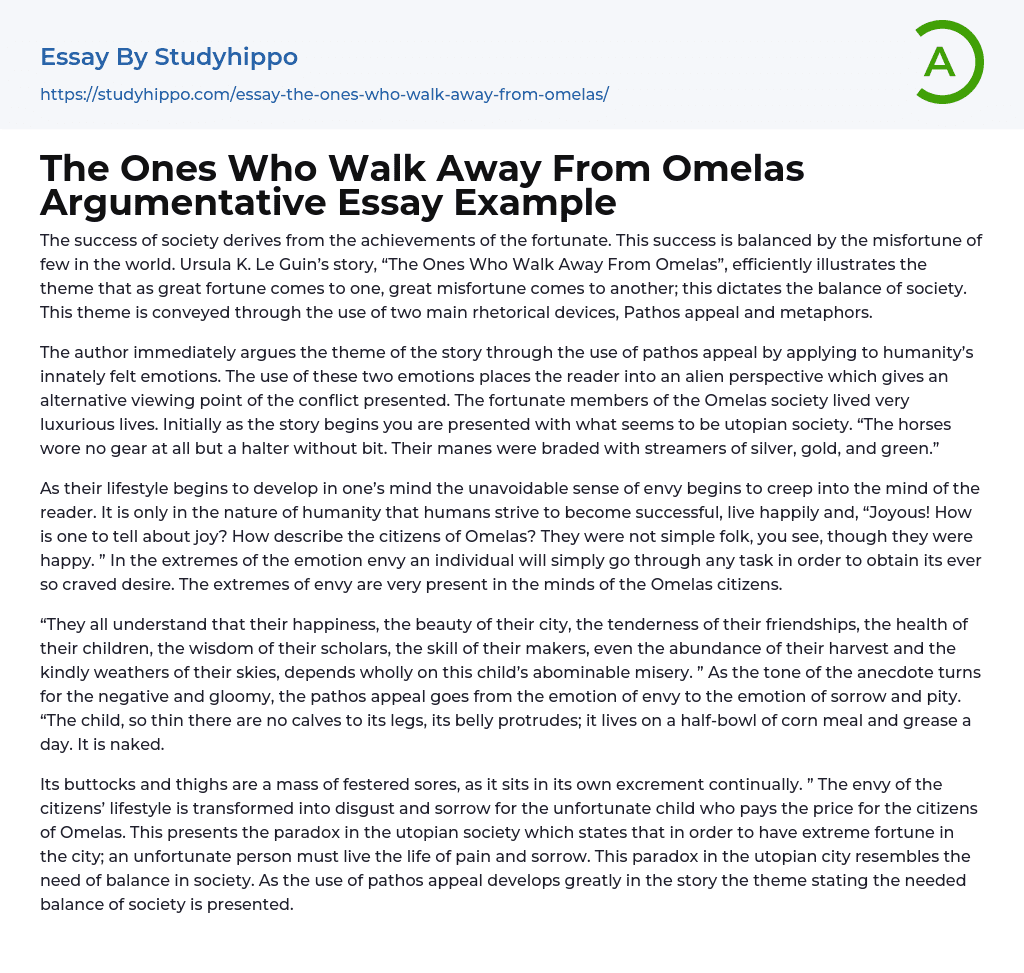The success of society derives from the achievements of the fortunate. This success is balanced by the misfortune of few in the world. Ursula K. Le Guin’s story, “The Ones Who Walk Away From Omelas”, efficiently illustrates the theme that as great fortune comes to one, great misfortune comes to another; this dictates the balance of society. This theme is conveyed through the use of two main rhetorical devices, Pathos appeal and metaphors.
The author immediately argues the theme of the story through the use of pathos appeal by applying to humanity’s innately felt emotions. The use of these two emotions places the reader into an alien perspective which gives an alternative viewing point of the conflict presented. The fortunate members of the Omelas society lived ve
...ry luxurious lives. Initially as the story begins you are presented with what seems to be utopian society. “The horses wore no gear at all but a halter without bit. Their manes were braded with streamers of silver, gold, and green.”
As their lifestyle begins to develop in one’s mind the unavoidable sense of envy begins to creep into the mind of the reader. It is only in the nature of humanity that humans strive to become successful, live happily and, “Joyous! How is one to tell about joy? How describe the citizens of Omelas? They were not simple folk, you see, though they were happy. ” In the extremes of the emotion envy an individual will simply go through any task in order to obtain its ever so craved desire. The extremes of envy are very present in the minds of the Omelas citizens.
<
style="text-align: justify">“They all understand that their happiness, the beauty of their city, the tenderness of their friendships, the health of their children, the wisdom of their scholars, the skill of their makers, even the abundance of their harvest and the kindly weathers of their skies, depends wholly on this child’s abominable misery. ” As the tone of the anecdote turns for the negative and gloomy, the pathos appeal goes from the emotion of envy to the emotion of sorrow and pity. “The child, so thin there are no calves to its legs, its belly protrudes; it lives on a half-bowl of corn meal and grease a day. It is naked.
Its buttocks and thighs are a mass of festered sores, as it sits in its own excrement continually. ” The envy of the citizens’ lifestyle is transformed into disgust and sorrow for the unfortunate child who pays the price for the citizens of Omelas. This presents the paradox in the utopian society which states that in order to have extreme fortune in the city; an unfortunate person must live the life of pain and sorrow. This paradox in the utopian city resembles the need of balance in society. As the use of pathos appeal develops greatly in the story the theme stating the needed balance of society is presented.
- Pressure essays
- Confidence essays
- Disgrace essays
- Lost essays
- Harmony essays
- Fairness essays
- Sarcasm essays
- Respect essays
- Responsibility essays
- Empathy essays
- Suffering essays
- Suspense essays
- Fear essays
- Feeling essays
- Loneliness essays
- Ambition essays
- Tolerance essays
- Hope essays
- Inspiration essays
- Kindness essays
- Shame essays
- Desire essays
- Doubt essays
- Grief essays
- Hate essays
- Laughter essays
- Passion essays
- Pride essays
- Forgiveness essays
- Happiness essays
- Humanity essays
- Loyalty essays
- Guilt essays
- Honesty essays
- Betrayal essays
- Need essays
- Boredom essays
- Courage essays
- Regret essays
- Anger essays
- Honor essays
- Honesty Is The Best Policy essays
- Age Of Enlightenment essays
- Ethos essays
- Time essays
- Acceptance essays
- Meaning Of Life essays
- Reality essays
- Natural Law essays
- Political Philosophy essays




